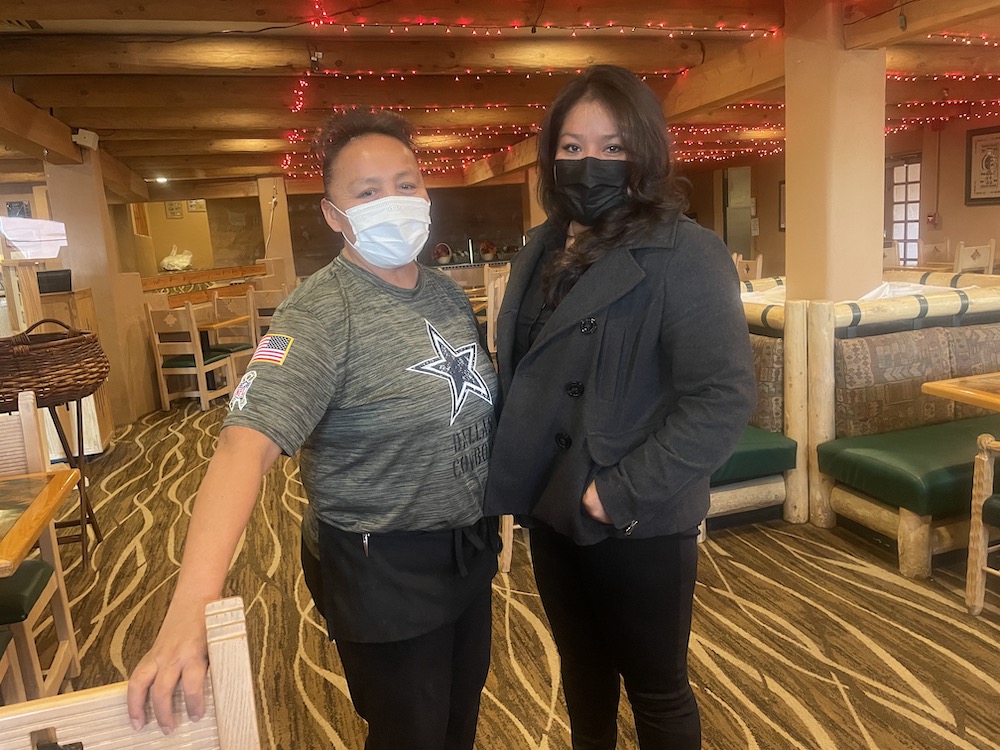
- Details
- By Levi Rickert
CHINLE, Ariz. (NAVAJO NATION) — After nearly three years, the requirement that people wear masks on the Navajo Nation was lifted through a public health order announced on Friday by newly inaugurated President Buu Nygren, Speaker Pro Tem Otto Tso and the Navajo Dept. of Health.
The order went into effect on Friday, Jan. 20, 2023 at 5 p.m. - MST.
The announcement came through a joint news release from the Navajo Nation Office of the President and Vice President and the Navajo Nation Office of the Speaker on Friday. The announcement was made in coordination with the Navajo Department of Health.
The announcement says wearing masks in public is optional with four exceptions: nursing homes, healthcare facilities, and schools that provide early childhood, primary and secondary education. People who have COVID-19 symptoms, test positive or were exposed to someone who tested positive must also wear masks.
Friday’s order states: “This past week…, the Navajo Nation has encountered 81 cases with a 7-day incidence rate of 51 cases per 100,000 people. The core metric measure of hospital beds is at 1.8 percent, 3/27 admission per 100,000 people as of January 18, 2023, which is classified as low risk.”
“It’s time for the Navajo people to get back to work,” Nygren said in the news release.”It’s time for them to be able to open their chapter houses to conduct local business and to receive services they are asking for and deserve.”
With more than 80,000 confirmed cases of COVID-19 and almost 2,000 deaths from the virus since March 2020, the Navajo Nation has been the epicenter for COVID-19 in Indian Country. As a result, the previous administration implemented strict stay-at-home orders, curfews, and face mask requirements.
The mask mandate was in effect for a total of 1,007 days on the Navajo Nation.
Just days after being inaugurated, Nygren appeared on Native News Online’s Native Bidaské (Spotlight). Asked if he was ready to lift the mask mandate still in effect on the Navajo Nation, Nygren said: “We need to completely open 100 percent. Because all surrounding communities around the Navajo Nation are 100 percent open. We’re the only ones that are maintaining this and it’s very difficult for normal Navajo people.
“As president, I want to make sure that the Navajo people have access to their government because a lot of them need just basic services or basic health right now. So as president, I’m actually working on making sure that we do lift that mandate and make it optional.”
Visits to a few local establishments in the Chinle area seemed to indicate that not all people were shedding the masks. On Friday night at a Denny’s restaurant, staff were wearing masks.
On Saturday morning, wait staff at Garcia’s Restaurant in Chinle were opting to continue to wear masks. For Lovelyn Draper (Navajo) the choice is personal because she had relatives die from COVID-19 and had contracted the virus herself. She told Native News Online wearing a mask provides a sense of protection for her when working with the public.
“I lived through this,” Draper said. “Several of my relatives died from COVID, including my grandparents, aunts and uncles. My five-year-old son is so used to wearing a mask, he is okay with wearing his. It has become normal.
Former President Jonathan Nez, who presided over the Navajo Nation during the pandemic, questioned the reasoning behind lifting the mask mandate in a series of posts on Twitter Friday night.
“The Navajo people should be asking the new administration for the comprehensive data to support their decision to lift the mask mandate. Was it a decision based on politics or the public health of the Navajo people?”
Myron Lizer, who served as vice president alongside Nez from 2019 to 2023, was more supportive of the move, tweeting: “It’s been nearly 3 years since the pandemic impacted our world, our Navajo economy was also impacted greatly! I commend Navajo President @BuuNygren for lifting the mask mandate on the Navajo Nation.”
In the prepared statement, Nygren acknowledged that COVID-19 is not going anywhere and individuals needed to take responsibility to continue healthy habits learned during the pandemic, including hand-washing and vaccinations.
“We, as a Nation, are much more aware and much more prepared than in April 2020.” Nygren said.
Tell Us What You Think
More Stories Like This
Utah May Take ‘The First Step of Many’ to Better Investigate Missing and Murdered Indigenous PeopleNational Indian Health Board's Strategic Plan Listening Tour Underway
‘You Are Never Alone’ | How One Tribe Is Fighting Youth Suicide With Culture and Crisis Response
‘Our Culture is Prevention’
This National Cancer Prevention Month, Reduce Your Risk


